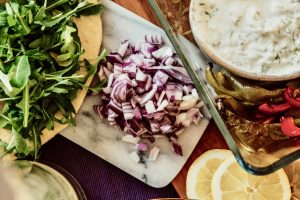The Gut-Immune Connection

By Sue Camp
Registered Nutritional Therapist
Why taking care of our gut health is a crucial part of taking care of our immune health
When we think about our immunity, we may not immediately consider our gut health. However, almost every type of disease has a gut connection somewhere. Our initial interface with the outside world is via our gastrointestinal (GI) tract. It serves two main functions: absorbing useful substances into the body (taking in the good stuff) and restricting the entry of harmful substances (keeping out the bad stuff). The intestinal epithelium is the single layer of cells that line the GI tract and are on the frontline. As part of its protective role, the epithelium forms an important component of the intestinal mucosal barrier.
The maintenance of a healthy gut microbiome is inseparable from overall health. Interestingly there is a bi-directional relationship between the gastrointestinal microbiome and innate immune system. Supporting a balanced intestinal microbial community is essential for the integrity immune system, for appropriate response to infections and rapid recovery from illness.
The cells found in those mucosal surfaces daily meet local challenges from foods, microbes and environmental pollutants. The result is a series of immunological decisions that on a single day exceed those made by the entire systemic immune system in a lifetime. Bacterial interaction with the mucosal immune system allows a complex transfer of information and there are many potential targets for intervention. Healthy microbiome equals healthy gut and healthy body.

Keeping a delicate balance in the immune system by eliminating evading pathogens while still maintaining self-tolerance to avoid immunity is essential for health. The gut microbiota provides essential benefits to its host, partly by regulating homeostasis or balance. Research shows that alterations in these gut microbial communities may result in immune imbalance and possible autoimmune processes.
Our diet (food and drink, including alcohol), our environment (toxic load) our medications (antibiotics and more) can all contribute to dysbiosis in the gut, but the major modulating factor on the composition of our microbiome is the food we eat.
Eat to feed your beneficial bugs! A diverse microbiome is a healthy microbiome with many different species playing different roles in your overall health. Diversity in the gut is achieved by diversity in the diet, especially plant-foods which are high in fibre. Different types of diet influence different species of bacteria. Research has shown that a Mediterranean diet can improve microbiome diversity and reduce inflammation. This focuses on eating plenty of fruit, vegetables, nuts, seeds and whole grains; healthy fats like high-quality extra virgin olive oil; and lean meat or fish. Avoid alcohol, salt, sweets and sugary drinks, and artificial sweeteners or other additives.
Research has shown that a Mediterranean diet can improve microbiome diversity and reduce inflammation
Further support for your microbiome can come from prebiotic and probiotic foods. Prebiotics are the non-digestible component of food, which feed the “friendly” gut bacteria. Best prebiotic food sources include apples, asparagus, artichokes, bananas, broccoli, cauliflower, fennel, garlic, legumes, leeks, onions, pak choi, wheat and oats.
Probiotics are microorganisms and the ‘friendly’ gut bacteria and can be found in fermented foods such as sauerkraut, fermented tempeh (type of soya), miso, kefir and yogurt. Other antiviral, gut supporting foods include garlic, ginger, thyme and turmeric.

Eating the wrong kinds of foods may of course have the adverse effects. Processed foods and high sugar foods can cause spikes in your blood sugar and contribute to unhealthy blood fat levels and inflammation.
When you’re planning your meals, plan to keep your good gut bugs happy too! The payback will be worth it!
ONLINE NUTRITIONIST COACHING
Learn more about Health and Wellbeing
Here are some articles and blogs about health and wellbeing



